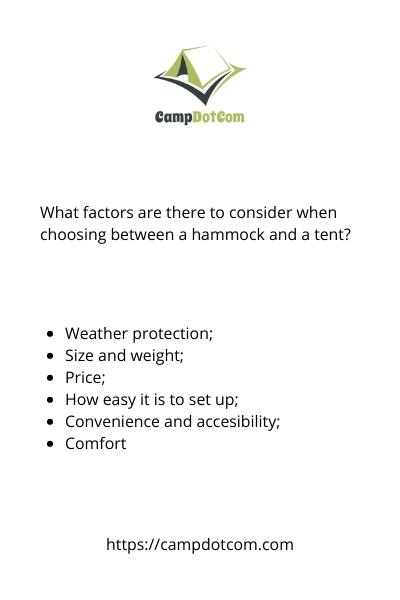If you've been paying attention to campgrounds in recent years, you've definitely noticed an increasing trend. No, it isn't the fact that Crocs are still remarkably popular among campers. The ever-increasing popularity of hammocks is being discussed.

More Things To Know About Is It Better to Use Tents or Hammocks
Yes, three feet off the earth is the hottest new way to camp.
We've all heard that swinging in a hammock on a weekend while reading a book and sipping an iced tea is a fantastic, soothing way to rock away your problems. Is it, however, a suitable method to spend a night in the wilderness?

There's a lot to be said for both sides of the tent vs. hammock debate. Let's get a better look!
Managing the Elements
Many people's initial thought when considering sleeping in a hammock is, "What about the rain?" What about mosquitos, chilly weather, or wind, you could ask?
As an Amazon Associate, I earn from qualifying purchases. Some of the links in this article are affiliate links. This means that, at zero cost to you, I will earn an affiliate commission if you click through the link and finalize a purchase.
Tents offer good protection against all of the above, with the exception of mosquitos, which can only be kept at bay with six cans of bug spray, a dozen tiki torches, a Voodoo sacrifice of three chickens, and a partridge in a pear tree.
Hammocks, on the other hand, can solve all of these issues. Overquilts and under quilts are available for most models to give warmth and wind protection.
Tarps can be purchased to cover the roof and keep the rain off. Mosquito nets are also available for purchase. They're said to be quite effective even without the chicken sacrifice.
The point is that, when properly set up, hammocks and tents are equally effective at shielding you from the elements.
Winner: Draw
Dimensions and Weight
An ultralight tent weighs slightly more than two pounds. A heavier-duty tent can easily weigh six, eight, or more pounds.
In comparison, consider a hammock. Even heavy-duty hammocks weigh little more than two pounds, making hammocks the clear winner in this area.
But that assumes you're only transporting the hammock. In actuality, you'll need a mosquito net, a rain tarp, quilts, or a mix of the three. You'll still come out ahead because you won't have to transport any tent poles. However, while hammocks have a weight advantage, it is less than many people believe.
Winner: Hammock
Price
A decently dry summer tent may be had for around $200. A well-made all-season tent can be had for $400 to $500. You can acquire a tent that is as luxurious as some hotels for $800 or $900. Doesn't that sound like a decent deal?
Hammocks are significantly less expensive. You can acquire a great rig for camping on dry summer nights for $50 or $60. For $200, you'll be prepared for rain and mild cold. Some of the greatest hammock sets are available for under $500.
Winner: Hammock
Choosing a Campground
One of the tenets of Leave No Trace camping is to avoid sleeping somewhere that isn't already bare ground. That can be difficult to do with a tent, especially a large tent with vestibules.
In comparison, all you need for hammock camping is a pair of trees. However, there are several campgrounds that are devoid of trees. If you're in brush, desert, or other open terrains, a tent is still a feasible alternative, whereas a hammock will just leave you hanging.
Winner: Draw
Storage Capacity
It's useful to be able to keep your pack dry when camping in bad weather. It's also convenient that it's easily accessible. What's the purpose of having a nice, dry tent if you have to get out every time you want to reach into your backpack?
Many tents offer huge vestibules with plenty of space for your backpack, boots, and rain poncho for these rainy-day conditions.
With a hammock, your best bet is to leave your luggage on the ground beneath you, which offers just minimal protection.
Winner: Tent
Comfort
You don't always get to choose the comfiest sleeping surface. This is especially true in wooded places where there isn't a square foot of ground without a root or rock protruding like a piece of the world's most sadistic chiropractor's table.
In a tent, you must either make the best of a poor situation or transport a heavy air mattress. Who cares about roots in a hammock? You're sleeping on a cloud.
Winner: Hammock
The Final Decision
In total, we examined six aspects of performance: weather protection, size and weight, price, selecting a campsite, storage capacity, and comfort. Hammocks were the best in three categories, tents were the best in one, and the other two were a tie.
It appears the hammocks have won. Having said that, as you can see, tents still have significant advantages that make them a preferable alternative in a variety of situations.
